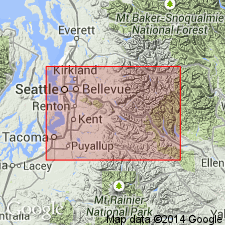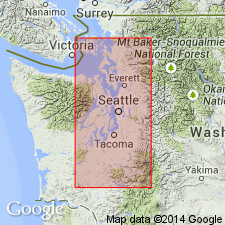
- Usage in publication:
-
- Lawton formation
- Modifications:
-
- Named
- Dominant lithology:
-
- Clay
- Sand
- AAPG geologic province:
-
- Puget Sound province
Summary:
Type locality designated as sea cliffs in Fort Lawton area, just south of West Point, Seattle area, WA. Consists of clay phase with interbeds of sand in lower part that grades upward at 150 to 160 ft into coarse sand that forms upper part of unit. Thickness is at least 250 ft south of West Point with base below sea level. Most extensive of major depositional units predating last glacial stage. Lawton sediments may have been deposited during recession of glacier that deposited Klinker till (new) thus repeating Beacon-Duwamish relationship. Underlies Vashon till. Is Pleistocene age.
Source: GNU records (USGS DDS-6; Menlo GNULEX).

- Usage in publication:
-
- Lawton Clay Member*
- Modifications:
-
- Revised
- Adopted
- AAPG geologic province:
-
- Puget Sound province
Summary:
Lawton Formation [Mackin and others, 1950] is restricted to middle unit of glaciolacustrine clay and silt; it is here designated Lawton Clay Member of Vashon Drift. Upper sand phase is designated Esperance Sand Member of Vashon Drift. Nonglacial sediments of lower part are not formally named. Lawton Clay Member consists of upper part of chiefly clayey silt which grades downward into lower part of finer grained beds of dark-gray clay containing thin light-gray silt layers. Type section designated as sea-cliff exposures on southwest side of Fort Lawton sec.16 T25N R3E, Seattle, King Co, WA. Radiocarbon ages from unnamed nonglacial sediments indicate Puget glacial lobe of Vashon age advanced in area some time after 15,000 yr B.P. Is Pleistocene age.
Source: GNU records (USGS DDS-6; Menlo GNULEX).
For more information, please contact Nancy Stamm, Geologic Names Committee Secretary.
Asterisk (*) indicates published by U.S. Geological Survey authors.
"No current usage" (†) implies that a name has been abandoned or has fallen into disuse. Former usage and, if known, replacement name given in parentheses ( ).
Slash (/) indicates name conflicts with nomenclatural guidelines (CSN, 1933; ACSN, 1961, 1970; NACSN, 1983, 2005, 2021). May be explained within brackets ([ ]).

